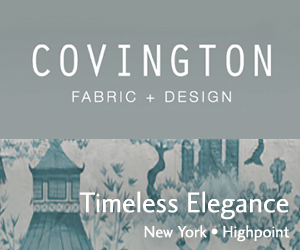Brentwood Has Seen Big Changes in the World of Asian Imports
April 3, 2001
Early Importers Discuss the Challenges of 'Being There First'
Los Angeles – A few phones, some simple equipment, talent and detailed workmanship are what Hal Alden had with him when he ventured off to Japan in 1957, looking for someone to make his quilted bedspreads.
Forty-four years ago, importing from Asia was a completely different experience from what it is today, said Alden, founder and president of the $125 million a year import company Brentwood Originals. But while he was in Osaka on that original trek – a trip he took for $5,000 – several things happened that were to change the course of his life and his company.
"I had invented the hand-guided quilted bedspread, and we were shipping from L.A. all over the country to exclusive shops, such as Marshall Field in Chicago," said Alden. "But making them was a very expensive process. Well, goods from Japan were so cheap that if an article carried the 'made in Japan' label, it was almost a joke. But I decided to go to Japan to see if I could find someone to make the quilt."
Going to Japan in the 1950s was like going to the moon: it was so novel and interesting, he said. His meetings with people from the Japanese trading company took place in hotel room the size of a salt box.
"At the hotel, my interpreter asked what was in the box under my bed. I showed him the dupioni silk pillow covers I had brought with me, made by a company called Nettle Creek, in about fifteen glorious colors. He said he could introduce me to someone at Kanebo, one of the largest silk mills in the world, if I was interested in silk. I was." Brentwood Originals had been selling the pillow covers at its Robertson Boulevard showroom, and on a whim, he'd brought a boxful of them.
Alden struck a deal with the executives at Kanebo for the purchase of 48" wide silk for $1 a yard. He discovered later that his unknown benefactor in the deal was DuPont, which with its new "miracle fiber," polyester, was totally wiping out the silk garment market. Kanebo, therefore, was looking for an outlet for its silk as much as he was looking to buy it. When he brought the first pillows back, they were of highest quality and workmanship but sold at much lower price points than the Nettle Creek ones. He couldn't get enough of them.
"The Japanese sew so beautifully," he said. "They get credit for it now, but back then, I was one of the first to recognize it." Brentwood Originals claims 50 percent of the total market today in decorative pillows, and sells in excess of $150 million annually.
During his first stay, he also met a 60-year-old Japanese gentleman, Mr. Iwai, who was to be his mentor for the duration of his manufacturing years in Japan. "He was like a father figure to me. He guided me how to work with the Japanese, he let me come to his home – which was highly unusual for such private people – and he taught me that there's always room to increase quality. 'Never say it is perfect,' he used to say to me. And do you know, no one has ever been able to duplicate the beauty and quality of the silk pillows we made in Japan in those years."
He stayed in Japan for six months of that first year, traveling back and forth every 30 to 60 days because he not only had to teach the workers how to sew the product, he had to oversee the process. Nothing was easy or fast. In fact, he quickly realized that the quilted bedcovers would never be as cost effective to produce as the silk pillows, so after analyzing what a sewing machine could produce and comparing the value of the pillows versus the bedspreads, he abandoned the original idea and never went back to it.
Alden's 44-year-old son, David, recalls the early import days. "I remember when I was in grade school and he was importing from Japan," he said. "He used to tell me stories that he had to bring over all the attachments for the sewing machines because they didn't have the stuff over there. He'd be over there for months. He was one of the real pioneers for importing in the textile industry in this country. He pioneered the whole import business before anyone knew what it was."
But U.S. quota eventually put a damper on imports from Japan, and the Japanese started manufacturing elsewhere in Asia.
Manufacturing centers sprang up in Taiwan, Korea, and other places. Brentwood Originals began to import from these countries, and has more recently added India to its source list.
"As the Japanese styled up, they brought their expertise to other Asian countries, and forced the quality to get better in Taiwan, then in Korea, then in China," Alden said. When Nixon opened trade with mainland China, Brentwood was among the first companies to be invited, and one of the first seven to get a visa.
Both Hal and David Alden remarked on the rapid transformation they have witnessed in China. They'll tell you that the country has not only developed quickly but it has also improved the quality of its production in a few short years.
"China, much more so than India, has developed almost overnight," said David. "On my first couple of trips to China, there was only one hotel, and you could look over the river and hear the boats at night. And the room was just black, the mahogany was so dark. It was depressing. On my last trip I stayed at a beautiful, lavish, 5-star hotel. It's amazing how fast it's grown and changed."
"Today, I can't even recognize the place," Hal said. He described the hand embroidery of the Chinese as exquisite, and said that the textile industry "is coming up quickly" in its quality. Although the Chinese are frequenly criticized by textile world for pirating designs, Alden disagrees with many of the accusations of dishonest dealings.
"They have been honorable in keeping their contract with me. They had never exported pillows before, and I asked for an exclusive on the pillows I was having them make. And for the last five or six years since we made the agreement, when others have approached them to make the same product, they have told those manufacturers that if they want that product, they will have to buy it from Brentwood Originals," Alden said.
"I think China is going to be the centerpiece of the Orient," he added.
During the last five years, Alden and Mel Rosenthal, Brentwood's executive vice president for the last 30 years, have begun to import soft window treatments and throws as well as decorative pillows.
"We think we have the best quality that's out there," said Alden, "because we can afford the detail in the designs and we can afford to make the throws bigger and better."
He expects the future to hold more of the same success for the company that pioneered imports from the Orient.
"You know, you've got to have a reasonable amount of talent in your field to be as successful as we've been. Brentwood Originals has grown in each of its 44 years. But it has taken effort – when you step off the plane in Asia there are no yellow pages to look in to find out where to get an item. We've had to develop resources that have never made the item before. We've had to explain what we want to every industry involved in the process," he said.
Los Angeles – A few phones, some simple equipment, talent and detailed workmanship are what Hal Alden had with him when he ventured off to Japan in 1957, looking for someone to make his quilted bedspreads.
Forty-four years ago, importing from Asia was a completely different experience from what it is today, said Alden, founder and president of the $125 million a year import company Brentwood Originals. But while he was in Osaka on that original trek – a trip he took for $5,000 – several things happened that were to change the course of his life and his company.
"I had invented the hand-guided quilted bedspread, and we were shipping from L.A. all over the country to exclusive shops, such as Marshall Field in Chicago," said Alden. "But making them was a very expensive process. Well, goods from Japan were so cheap that if an article carried the 'made in Japan' label, it was almost a joke. But I decided to go to Japan to see if I could find someone to make the quilt."
Going to Japan in the 1950s was like going to the moon: it was so novel and interesting, he said. His meetings with people from the Japanese trading company took place in hotel room the size of a salt box.
"At the hotel, my interpreter asked what was in the box under my bed. I showed him the dupioni silk pillow covers I had brought with me, made by a company called Nettle Creek, in about fifteen glorious colors. He said he could introduce me to someone at Kanebo, one of the largest silk mills in the world, if I was interested in silk. I was." Brentwood Originals had been selling the pillow covers at its Robertson Boulevard showroom, and on a whim, he'd brought a boxful of them.
Alden struck a deal with the executives at Kanebo for the purchase of 48" wide silk for $1 a yard. He discovered later that his unknown benefactor in the deal was DuPont, which with its new "miracle fiber," polyester, was totally wiping out the silk garment market. Kanebo, therefore, was looking for an outlet for its silk as much as he was looking to buy it. When he brought the first pillows back, they were of highest quality and workmanship but sold at much lower price points than the Nettle Creek ones. He couldn't get enough of them.
"The Japanese sew so beautifully," he said. "They get credit for it now, but back then, I was one of the first to recognize it." Brentwood Originals claims 50 percent of the total market today in decorative pillows, and sells in excess of $150 million annually.
During his first stay, he also met a 60-year-old Japanese gentleman, Mr. Iwai, who was to be his mentor for the duration of his manufacturing years in Japan. "He was like a father figure to me. He guided me how to work with the Japanese, he let me come to his home – which was highly unusual for such private people – and he taught me that there's always room to increase quality. 'Never say it is perfect,' he used to say to me. And do you know, no one has ever been able to duplicate the beauty and quality of the silk pillows we made in Japan in those years."
He stayed in Japan for six months of that first year, traveling back and forth every 30 to 60 days because he not only had to teach the workers how to sew the product, he had to oversee the process. Nothing was easy or fast. In fact, he quickly realized that the quilted bedcovers would never be as cost effective to produce as the silk pillows, so after analyzing what a sewing machine could produce and comparing the value of the pillows versus the bedspreads, he abandoned the original idea and never went back to it.
Alden's 44-year-old son, David, recalls the early import days. "I remember when I was in grade school and he was importing from Japan," he said. "He used to tell me stories that he had to bring over all the attachments for the sewing machines because they didn't have the stuff over there. He'd be over there for months. He was one of the real pioneers for importing in the textile industry in this country. He pioneered the whole import business before anyone knew what it was."
But U.S. quota eventually put a damper on imports from Japan, and the Japanese started manufacturing elsewhere in Asia.
Manufacturing centers sprang up in Taiwan, Korea, and other places. Brentwood Originals began to import from these countries, and has more recently added India to its source list.
"As the Japanese styled up, they brought their expertise to other Asian countries, and forced the quality to get better in Taiwan, then in Korea, then in China," Alden said. When Nixon opened trade with mainland China, Brentwood was among the first companies to be invited, and one of the first seven to get a visa.
Both Hal and David Alden remarked on the rapid transformation they have witnessed in China. They'll tell you that the country has not only developed quickly but it has also improved the quality of its production in a few short years.
"China, much more so than India, has developed almost overnight," said David. "On my first couple of trips to China, there was only one hotel, and you could look over the river and hear the boats at night. And the room was just black, the mahogany was so dark. It was depressing. On my last trip I stayed at a beautiful, lavish, 5-star hotel. It's amazing how fast it's grown and changed."
"Today, I can't even recognize the place," Hal said. He described the hand embroidery of the Chinese as exquisite, and said that the textile industry "is coming up quickly" in its quality. Although the Chinese are frequenly criticized by textile world for pirating designs, Alden disagrees with many of the accusations of dishonest dealings.
"They have been honorable in keeping their contract with me. They had never exported pillows before, and I asked for an exclusive on the pillows I was having them make. And for the last five or six years since we made the agreement, when others have approached them to make the same product, they have told those manufacturers that if they want that product, they will have to buy it from Brentwood Originals," Alden said.
"I think China is going to be the centerpiece of the Orient," he added.
During the last five years, Alden and Mel Rosenthal, Brentwood's executive vice president for the last 30 years, have begun to import soft window treatments and throws as well as decorative pillows.
"We think we have the best quality that's out there," said Alden, "because we can afford the detail in the designs and we can afford to make the throws bigger and better."
He expects the future to hold more of the same success for the company that pioneered imports from the Orient.
"You know, you've got to have a reasonable amount of talent in your field to be as successful as we've been. Brentwood Originals has grown in each of its 44 years. But it has taken effort – when you step off the plane in Asia there are no yellow pages to look in to find out where to get an item. We've had to develop resources that have never made the item before. We've had to explain what we want to every industry involved in the process," he said.
















